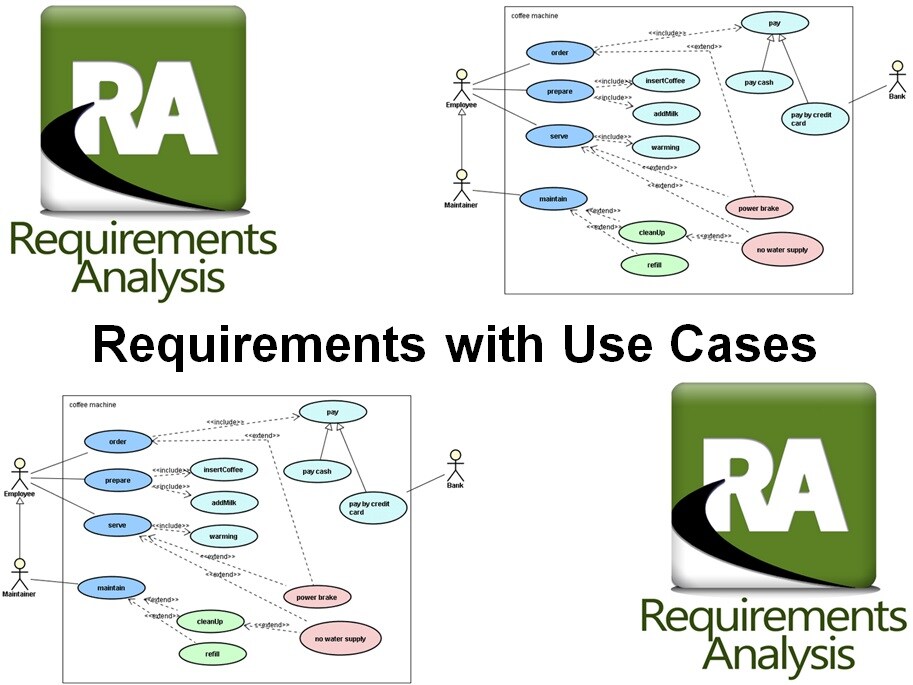-
Learning by doing
-
Trainers with practical experience
-
Classroom training
-
Detailed course material
-
Clear content description
-
Tailormade content possible
-
Training that proceeds
-
Small groups
The course Requirements with Use Cases focuses on Use Case modeling. Use Cases are a widely used analysis technique for specifying the functional requirements of a software system and providing a framework for test case development.
The course Requirements with Use Cases starts with a discussion of the different types of requirements such as functional and non-functional requirements.
Next attention is paid to the creation of Use Cases that describe the typical use of a system by external actors. Use Cases are used in communication with stakeholders and to gain insight into the size, complexity and interaction with the system.
Then Use Case Modelling is covered. Not only the description of the Use Cases in a textual document is discussed, but also the visualization of the Use Cases in a Use Case diagram. Attention is also paid to the structuring of the Use Cases through reuse via includes, via extends and via generalizations.
The course Requirements with Use Case shows how a Use Case can be accurately described in a number of steps on the basis of a Use Case template. The focus is mainly on the success scenario but also important secondary scenarios should be specified.
More advanced techniques in Use Case Modeling are also treated such as using Activity Diagrams with guards, branching Use Cases and using iterations.
The course Requirements with Use Cases ends with a focus on Use Cases in the context of prototypes, the interfaces of the system and the test plan.
The course Requirements with Use Cases is intended for system analysts and developers who want to learn how the functional requirements of systems can be specified with Use Cases.
There are no specific prerequisites for the course Requirements with Use Cases. General knowledge of system development is desirable for a proper understanding.
The theory is presented in the form of presentation slides. Brief case studies are used to practice the techniques. Demo projects clarify the discussed concepts. The course material is in English. The course times are from 9.30 up and to 16.30.
Participants receive an official certificate Requirements with Use Cases after successful completion of the course.

Module 1 : Requirements |
Module 2 : Use Case Intro |
Module 3 : Use Case Modeling |
| Understanding Requirements Vision Documents Requirement Types Functional Requirements Non-Functional Requirements Requirements Determination Requirements Classification Requirements Specification Conflicting Requirements Requirements Risks The glossary |
Use Case approach Identifying stakeholders Use Case terminology Use Cases Identifying Actors Primary Actor Secondary Actors Define System scope System Context Diagram System Use Case Diagram Brief Use Case Description |
Use Case Modeling Identifying Use Cases Use Case Diagram Use Case Modeling Steps Drawing Use Cases Describing Use Cases High Level Use Cases Expanded Use Case Use Case Template Prioritizing Uses Cases Packaging Use Cases |
Module 4 : Scenario's |
Module 5 : Advanced Use Case Modeling |
Module 6 : Interfaces and Tests |
| Main success scenario Describing the steps Best Practices use case descriptions Other Scenarios Different types of scenarios Alternate scenarios and flows Alternate flows and exceptions Alternate scenario description |
Activity Diagramming Guards and Notes Branching with If Alternative Paths Scenarios Structuring Use Case Model Generalizations include and extends |
Usability requirements Prototyping Interface Requirements Interface Specifications Screen Functionality Interfaces in Iteration Plan Testing Use Case Test Plan |
